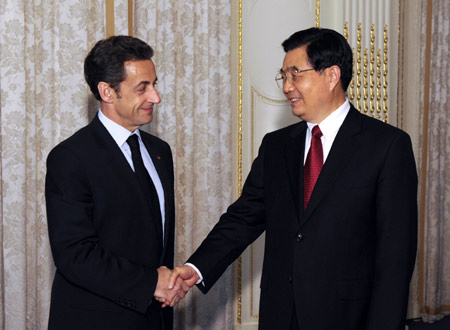The deepening financial crisis is a vital factor behind French President Nicolas Sarkozy's most recent pledge not to support "Tibet independence" in any form, Chinese analysts have noted.
 |
|
Chinese President Hu Jintao (R) shakes hands with French President Nicolas Sarkozy during their meeting in London, Britain, on April 1, 2009. [Li Xueren/Xinhua] |
"Now more than ever, cooperation is the main focus for all countries confronted by the ongoing crisis. A tense Sino-French relationship works directly against this," Feng Zhongping, European studies director at the China Institute of Contemporary International Relations, told China Daily yesterday.
A joint statement issued on Wednesday by the two countries said: "France fully recognizes the importance and sensitivity" of the Tibet affairs and reiterated "the position that Tibet is an integral part of Chinese territory".
It said France refused to back any claim of "Tibetan independence" and that both countries adhered "to the principle of non-interference in each other's affairs".
Yesterday, Foreign Ministry spokesman Qin Gang said China appreciates France's explicit commitment not to back any form of "Tibetan independence".
Sino-French relations have been at a standstill since last December when Sarkozy met with the Dalai Lama, Old Tibet's supreme leader, after numerous Chinese warnings.
As a result, the China-EU meeting was deferred by China, a move Chinese experts estimated cost the Europeans up to 10 billion euros because Premier Wen Jiabao had planned to lead a 150-strong delegation to buy goods from Europe.
China says France should take full responsibility for the sour relations, but France voiced its disagreement.
On Wednesday, China and France announced they would hold high-level contacts and strategic dialogues "at a proper time".
According to Feng, "the fact that France is willing to make a compromise now is because the Sarkozy administration has enhanced its understanding of the Chinese government and its core interests".
The two sides' most obvious difference is that while the Tibet affair is seen by China as a sovereignty issue, it is addressed by France as a human rights and religious matter, he said. But now, France has come to realize that it is a core interest for China, and as such, "it involves territorial sovereignty, which is indisputable for China as a sovereign state", he added.
This year marked the 45th anniversary of diplomatic relations between China and France.
Hu told Sarkozy on Wednesday the bilateral ties "offer a profound inspiration and teach us a lot".
For France, not the least of that inspiration is the necessity for restoring relations with China so as to boost its troubled, strike-plagued economy, said Zhao Junjie, a senior researcher with the Chinese Academy of Social Sciences.
"This marked the failure of Sarkozy's use of the 'Tibet card', which he earlier hoped would divert domestic grievances against his policies by pressuring China for economic gains," Zhao said.
But when Sarkozy found that the "Tibet card" led to even worse economic relations with China, his administration, enmeshed in crisis, called a halt to the strategy, he said.
(China Daily April 3, 2009)